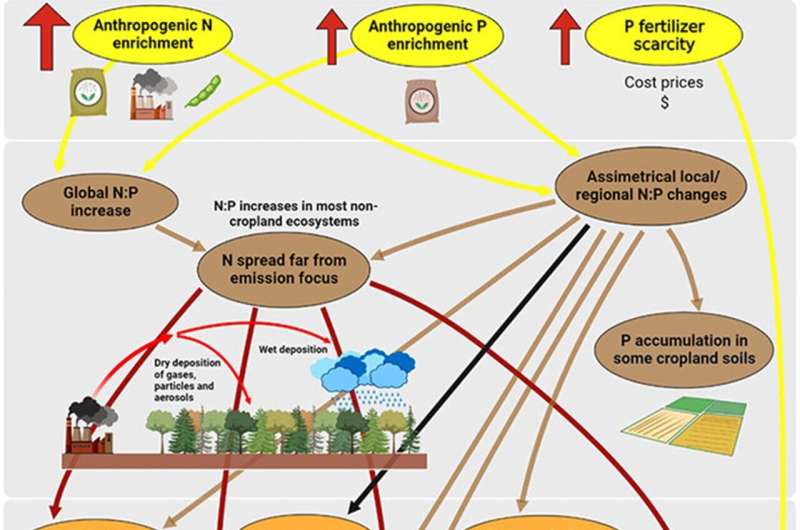This article has been reviewed according to Science X's editorial process and policies. Editors have highlighted the following attributes while ensuring the content's credibility:
fact-checked
proofread
Human actions are causing global nutrient shifts, finds study

In a study released on August 24, 2023, in the journal Eco-Environment & Health, the Global Ecology Unit CREAF‐CSIC‐UAB delved into the profound health implications of changing N:P ratios. This comprehensive analysis spanned across non-infectious to infectious diseases, unraveling their intricate ties to these nutrient imbalances and revealed the deep influence of global fertilizer disparities on human growth patterns.
Specifically, the observed differences in height among men in affluent countries appeared to be directly related to changes in their intake of nitrogen and phosphorus. Excessive use of nitrogen-based fertilizers increased the risk of diseases such as coeliac, mainly due to the presence of allergenic proteins like gluten. Alarmingly, young children under the age of 5 showed increased vulnerability to nitrates in their drinking water, which was a direct result of uncontrolled fertilizer use.
Further investigation into the connection between phosphates and cancer revealed startling discoveries. Consuming higher levels of phosphates led to tumor growth in experimental animals. The imbalanced ratio of nitrogen to phosphorus resulting from elevated phosphate consumption was closely linked to an increased occurrence of cancer. This mounting presence of phosphate in food, a direct consequence of human activities, raises serious concerns about food safety.
However, amid these troubling findings, the study also provided a ray of hope. It proposed the promising idea of incorporating the stoichiometric theory into cancer treatments. By adjusting the ratios of nitrogen to phosphorus, it could potentially enhance the effectiveness of certain therapies, introducing a new strategy against this disease.
Furthermore, the research shed light on infectious diseases, emphasizing the crucial role of environmental nutrient balance in the proliferation and transmission of pathogens. Malaria, for example, a disease that affects millions of people every year, stood out prominently in this context. Changes in N:P ratios could impact the habitats and reproductive rates of carriers like mosquitoes, consequently exacerbating the spread of the disease.
Essentially, this study emphasizes the urgent need to comprehend and tackle the complex consequences of nutrient imbalances on global health. By delving deeper into the intricacies of the N:P ratio, we can develop innovative strategies for managing fertilizers. By addressing these imbalances, we may equip ourselves with the means to combat prevalent diseases and foster a healthier global community.
More information: Josep Penuelas et al, Human-driven global nutrient imbalances increase risks to health, Eco-Environment & Health (2023). DOI: 10.1016/j.eehl.2023.08.003
Provided by TranSpread



















